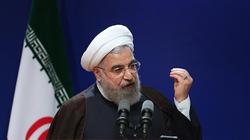 Iranian President Hassan Rouhani underlined that the US sanctions and maximum pressures by enemies will not be able to make Tehran sit to the negotiating table with Washington.
Iranian President Hassan Rouhani underlined that the US sanctions and maximum pressures by enemies will not be able to make Tehran sit to the negotiating table with Washington. RNA - "The Americans have come to this conclusion that they have adopted a wrong strategy for the path they have chosen. Of course, sanctions naturally create some problems, but they will not yield any results for the enemies," President Rouhani told reporters in a press conference in Tehran on Sunday.
He said the US is completely wrong to think that they can force Iran to sit to the negotiating table.
"We will never sit to the negotiating table with a weak position," Rouhani said.
"Maximum pressure has failed. We are in a better situation in the region now. We have good conditions considering internal unity," he added.
Rouhani said enemies intended to push the Iranian people into the conclusion that they cannot bear the situation without an agreement with the US, but their plots were thwarted by the Iranian nation's resistance.
"If the US returns to the nuclear deal and removes the sanctions, it can come and negotiate with us within the framework of the G5+1," he underscored.
Rouhani also said that there is no difference for Iran between the US democrats and republicans as Tehran merely attaches importance to its national interests.
In relevant remarks earlier this month, Iranian Parliament Speaker Ali Larijani underlined the need for more attention to internal capacities to improve the country, describing sanctions as a driving force to increase power.
"Despite the fact that most of the country's needs were supplied through imports in the past, the focus for supplying goods is on indigenized products after sanctions," Larijani said, addressing a ceremony in the Southwestern province of Khuzestan.
According to Fars News Agency, he noted that the internal and knowledge-based companies have become more active and strengthened the country after sanctions, and continued, "This will improve the economic conditions next year."
"Iran has for years stood on its feet and played an important role in the region which is a great job and a source of honor for the country," Larijani said.
Washington’s unilateral sanctions against Tehran began in November 2018, five months after US President Donald Trump withdrew from an international deal on Iran’s nuclear program.
Claiming that the bans were working properly, Trump tightened them in May, only to see that Iran was finding new solutions to recoup the losses.
847/940